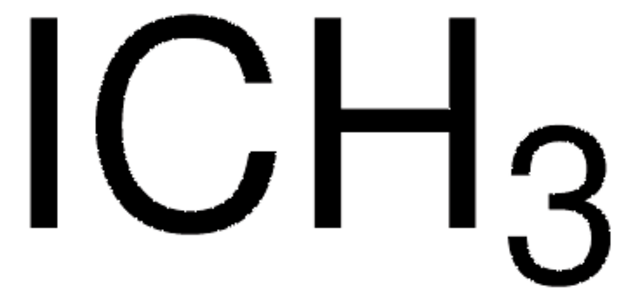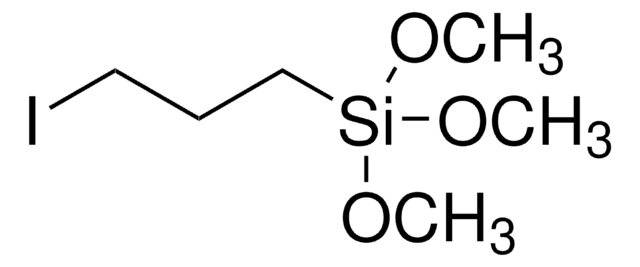413364
3-(Triethoxysilyl)propylisocyanat
95%
Synonym(e):
Triethoxy-(3-isocyanatopropyl)-silan, 3-Isocyanatopropyl-triethoxysilan
About This Item
Empfohlene Produkte
Qualitätsniveau
Assay
95%
Form
liquid
Brechungsindex
n20/D 1.42 (lit.)
bp
283 °C (lit.)
Dichte
0.999 g/mL at 25 °C (lit.)
Funktionelle Gruppe
amine
isocyanate
SMILES String
CCO[Si](CCCN=C=O)(OCC)OCC
InChI
1S/C10H21NO4Si/c1-4-13-16(14-5-2,15-6-3)9-7-8-11-10-12/h4-9H2,1-3H3
InChIKey
FRGPKMWIYVTFIQ-UHFFFAOYSA-N
Suchen Sie nach ähnlichen Produkten? Aufrufen Leitfaden zum Produktvergleich
Anwendung
- As a bifunctional reagent (isocyanate and ethoxysilyl groups) for the immobilization of cellulose derivatives onto silica matrix to generate bonded type of chiral stationary phases (CSPs).
- To convert 5-amino-1,10-phenanthroline into 5-(N,N-bis-3-(triethoxysilyl)propyl)-ureyl-1,10-phenanthroline, a hydrolysable sol–gel precursor.
- To synthesize ruthenium bipyridyl tethered porous organosilica(Ru-POS) for organo-photocatalysis.
- To synthesize nanoparticle-supported oxime palladacycle catalyst for Suzuki-Miyaura cross-coupling reaction.
Signalwort
Danger
Gefahreneinstufungen
Acute Tox. 1 Inhalation - Acute Tox. 4 Dermal - Acute Tox. 4 Oral - Eye Dam. 1 - Resp. Sens. 1 - Skin Corr. 1B - Skin Sens. 1
Lagerklassenschlüssel
6.1A - Combustible acute toxic Cat. 1 and 2 / very toxic hazardous materials
WGK
WGK 3
Flammpunkt (°F)
223.7 °F - closed cup
Flammpunkt (°C)
106.5 °C - closed cup
Persönliche Schutzausrüstung
Faceshields, Gloves, Goggles, type ABEK (EN14387) respirator filter
Hier finden Sie alle aktuellen Versionen:
Besitzen Sie dieses Produkt bereits?
In der Dokumentenbibliothek finden Sie die Dokumentation zu den Produkten, die Sie kürzlich erworben haben.
Kunden haben sich ebenfalls angesehen
Unser Team von Wissenschaftlern verfügt über Erfahrung in allen Forschungsbereichen einschließlich Life Science, Materialwissenschaften, chemischer Synthese, Chromatographie, Analytik und vielen mehr..
Setzen Sie sich mit dem technischen Dienst in Verbindung.





![1,8-Diazabicyclo[5.4.0]undec-7-en (1,5-5) 98%](/deepweb/assets/sigmaaldrich/product/structures/120/564/5b373e23-1624-489c-8efb-692de0f96ffb/640/5b373e23-1624-489c-8efb-692de0f96ffb.png)





![Bis-[3-(triethoxysilyl)-propyl]-tetrasulfid technical, ≥90% (NMR)](/deepweb/assets/sigmaaldrich/product/structures/242/790/625f5cba-32bd-4acf-a3be-e119e9cf844f/640/625f5cba-32bd-4acf-a3be-e119e9cf844f.png)